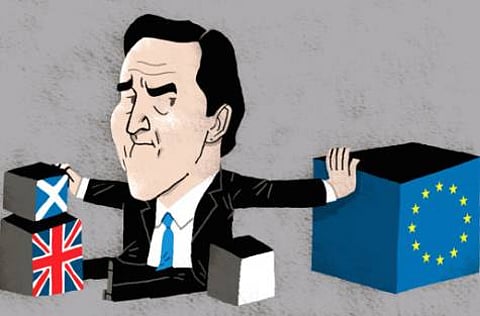Cameron’s rhetoric is hardly convincing
British PM’s threats are producing no tangible results apart from animosity from EU counterparts

What on earth is the British Prime Minister playing at? David Cameron should be seeking to increase his country’s geopolitical influence but, instead, he is clearly out to diminish it. Following his misguided Scottish referendum on independence, which could have resulted in a much smaller British isles in geographical and economic terms, he is now charting a course that could take the United Kingdom out of the European Union (EU). Indeed, if the Conservatives win next year’s election, they will not only embark on renegotiating Britain’s EU membership, but will hold a referendum on the country’s exit.
It is certainly true that many Britons are cheering Cameron on, whether out of resentment that Brussels is calling Westminster’s tune or because they are against European immigrants ‘taking their jobs’ or because they perceive the UK’s commitment to the EU’s coffers as an unfair burden, draining the economy. In fairness, some of those gripes do, indeed, hold water to one extent or another.
A large proportion of the billions the UK is duty-bound to pay to Brussels is spent on administration or goes to assist poorer EU member states that were rushed in purely for geopolitical reasons notwithstanding their far-from-healthy economies. It has not helped the argument of Europhiles that Britain has been “ambushed” with a £1.7 billion (Dh9.8 billion) budget bill that has been vigorously disputed by the Chancellor of the Exchequer George Osborne, not to mention outraged British taxpayers. Cameron who, like former British premier Margaret Thatcher, has few friends in Brussels, has warned the demand could turn out to be the last straw, pushing Britain over the edge. Thatcher was truly ‘The Iron Lady’ whereas Cameron’s mettle is as soft as his international stature.
Cameron is patently nervous about UK Independence Party’s (Ukip) phenomenal rise in popularity. Ukip — led by personality-packed Nigel Farage — wants Britain out of the EU and has surged way past the Liberal Democrats in polls. The public is divided but, thus far, 52 per cent of Britons say they will not vote for the party, while only 36 per cent back quitting Europe.
It is a fact that a mere 13 per cent of the electorate view Labour Party leader Ed Miliband as fit to be the next prime minister, but this does not mean that the Tories can expect to romp to the finish line without a coalition partner-in-waiting. Cameron’s approval rating is nothing to write home about at just 37 per cent. And it is unsure whether LibDem chief Nick Clegg will agree to continuing the current marriage between strange bedfellows. He has held his nose to support a referendum on the EU, but at the same time, he urges the public to see the big picture rather than focus on “spats”.
“We have always been a great trading nation and an open society,” he argues. “There is simply no future for you all, your country, if we turn our backs on the world and try to pull up the drawbridge, if we try and wish away the world around us.”
Given Clegg’s sentiments, Cameron may be eyeing-up anti-EU Ukip as a future lifeline. Farage has displayed his readiness to shake hands provided he receives guarantees that an in-out referendum is a sure thing.
What is the big picture? What would Britain lose by withdrawing from the EU and going it alone?
n Political isolation on the European continent with a consequent reduction in diplomatic clout and international prestige.
- Free trade. The EU is the UK’s main trading partner. Unfettered access to the European market’s 500 million consumers has been an engine of Britain’s economic success. If Britain has to pay tariffs it would lose its competitive edge.
- The loss of European workers, who do jobs Britons do not want and pay taxes, could adversely impact the economy. Employers would be forced to increase wages to attract staff which would be inflationary.
- A negative impact on foreign investment. The Confederation of British Industry (CBI) vehemently opposes a pull-out. CBI president and chairman of BT Group, Mike Rake, says Britain faced a choice between two futures he said. “One, in which we risk looking inward, shutting ourselves off from the world in the face of inevitable global change ... The other, in which we embrace the openness which has always been the foundation of Britain’s success.”
- An end to the “Four Freedoms” enshrined in the Treaty of Rome — free movement of goods, services, capital and people. This could be disastrous for Britons residing and working in EU countries as well as hundreds of thousands of retirees; one million have settled in Spain alone.
The above list is far from comprehensive and as former British prime minister John Major has warned, a negotiated exit is likely to cost the UK billions. Its implementation will take years, possibly triggering a reduction in market confidence. Moreover, if the divorce is tinged with bitterness, the financial services sector fuelling the City of London could decide to emigrate.
Cameron’s table thumping and threats are producing no tangible results apart from animosity from his European counterparts sick of his tantrums. One thing is certain — there will be few tearful adieus in Berlin, Paris or Brussels if the UK heads for the door, rather the sound of popping corks and sighs of relief.
Linda S. Heard is a specialist writer on Middle East affairs. She can be contacted at lheard@gulfnews.com


